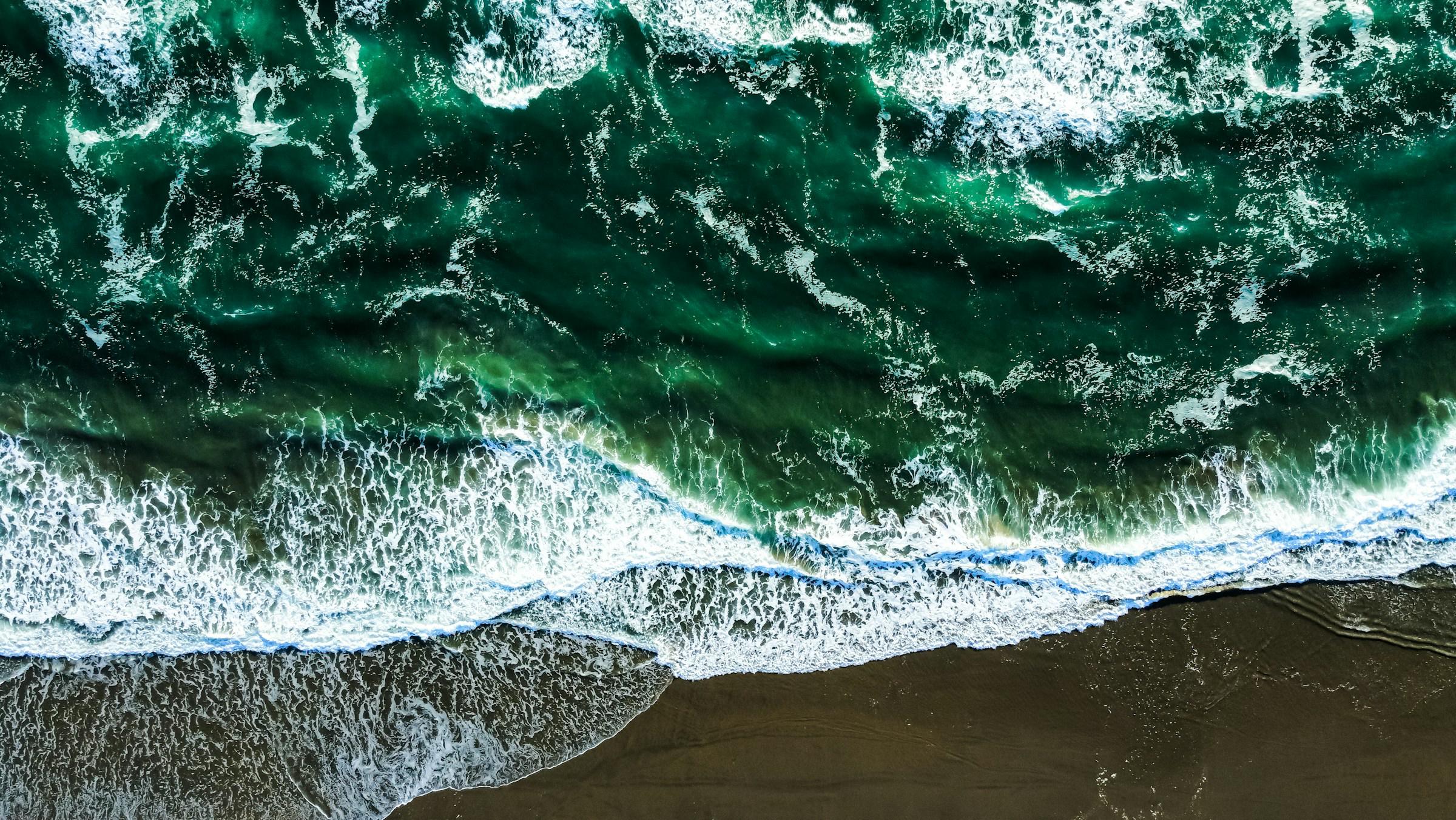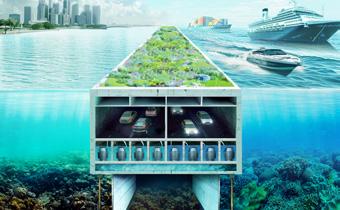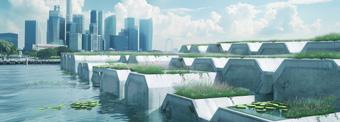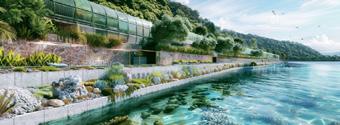

Coastal Protection and Flood Resilience Institute (CFI) Singapore
Climate change is driving more extreme weather with more intense rainfall.
As an island, Singapore is particularly vulnerable to sea level rise, due to its geographical location and low-lying land area — about 30% of land surface is less than five metres above mean sea level. Without a robust coastal protection system in place, severe flooding events could bring about devastating consequences, affecting essential services and critical infrastructure.
The Coastal Protection and Flood Resilience Institute (CFI) Singapore was launched as the nation’s first Centre of Excellence dedicated to strengthening local capabilities and expertise in coastal protection and flood management research and solution development.
CFI Singapore is a key pillar under PUB, Singapore’s National Water Agency’s S$125 million Coastal Protection and Flood Management Research Programme (CFRP), which galvanises research and technology development in coastal protection and flood management.
Established as a multi-institutional, interdisciplinary research centre, CFI Singapore brings together the strengths of various local universities, research institutes and industry partners.
As the host of CFI Singapore, the National University of Singapore (NUS) works closely with Nanyang Technological University (NTU), Singapore University of Technology and Design (SUTD), Singapore Institute of Technology (SIT), and the Agency for Science, Technology and Research (A*STAR) to achieve the institute’s key missions:
• Generate core knowledge in coastal science
• Conduct use-inspired research for coastal protection and flood management solutions for urban and land-scarce coastlines
• Collaborate to foster research ecosystem including local and international universities, research institutes and industry partners
• Train a new generation of leaders, researchers and practitioners for coastal protection and flood management
CFI Singapore’s core and applied research is categorised into two horizontal domain areas (H1 and H2) and two vertical domain areas (V1 and V2).
H1 aims to inform the design of futureproof coastal structures by developing reliable design parameters that anticipate the impacts of climate change on coastal and rainfall processes.
H2 focuses on harnessing big data and machine-learning models to improve predictive systems for coastal and inland water events, enhancing accuracy of weather forecasts and bolstering earlywarning systems for emergency response.
Meanwhile, V1 focuses on developing novel coastal defence structures, emphasising adaptive, multi-functional and modular designs that integrate into existing infrastructure. This domain area aims to enhance resilience, minimise land use and establish new local design standards tailored to specific coastal dynamics and flood risks.
V2 leverages nature-based approaches to create robust, resilient hybrid solutions for coastal protection, which involves developing guidelines so they can be implemented, maintained and monitored over the long term.
Additionally, CFI Singapore will also assist PUB in proposing research focus and topics for applied research grant calls.
Coastal Protection and Flood Resilience Institute (CFI) Singapore 1
Coastal Protection and Flood Management Research Programme (CFRP) Research Framework
Horizontal 1 | Coastal Science Research
• Coastal processes (waves, current, storm surge, sediment transport)
• Extreme event (coupling of intense rainfall runoff and extreme sea levels, joint probability, events attribution)
Vertical 1 | Innovative Engineering Solutions for CP and FM
• Technologies for integrated infrastructure
• Construction techniques in deep waters
• Structural integrity
Vertical 3 | Sustainable Infra Solutions for CP and FM
• Low-carbon materials
• Lightweight, high-strength, corrosive-resistant materials
• Sustainable construction methods
Vertical 2 | Integrated Nature-based Solutions for CP
• Adaptive ‘green-grey’ hybrid solutions and large-scale testbed
• Framework for long-term monitoring
• Design criteria
RESEARCH
Coastal Science Research
• High-confidence design parameters for coastal processes
• Impact of climate change on coastal processes
• Impact on coastal protection measures
Vertical 4 | Smart Management Solutions for CP and FM
• Smart ops and emergency response
• Predictive ops of tidal gates and pumping stations
• Smart system for structural health monitoring
Horizontal 2 | Monitoring, Prediction and Digitalisation of Coastal Environment
• Next-generation sensing technology
• AI, machine learning and physics-informed analytics to process data streams
• Cyber-physical predictive systems to couple advanced numerical simulation research
Horizontal 3 | Integrated and Adaptive Planning
• Integrated coastal and urban planning tools
• Systems-level planning framework
• Social science research
• Flood loss curves
• Risk quantification
Integrated Nature-based Solutions
• Develop novel hybrid solutions
• Establish planning guidelines and engineering parameters for hybrid solutions
• Innovative approaches to implement
• Develop science-based monitoring and maintenance approaches Building
Monitoring, Prediction and Digitalisation of Coastal Environment
• Enhance predictive systems for coastal processes
• Enhance Singapore’s convective rainfall prediction
• Enhance predictive systems for runoff generation
Innovative Engineering Solutions
• Adaptive, multi-functional and integrated solutions
• Develop local design standards
V1 H2 V2 V4 H3 V3 H1 C C C A A A A A A A C Core research CP Coastal Protection FM Flood Management Applied research
Know-how
Coastal Protection and Flood Resilience Institute (CFI) Singapore 3
Tranche 1 projects (2023)

This project aims to develop models for simulating extreme local wind waves and storm surge conditions, enhancing the understanding of the combined risks these events pose when they occur concurrently.
FORECASTING FLOODS, FAST

This project aims to develop advanced modelling tools that integrate machine learning with existing data to significantly enhance the accuracy of storm surge and wave forecasts along Singapore’s coastlines.
Development of probability distributions and extreme value analysis for storm surge levels, currents, wind waves and astronomic tides
PI: Dr Pavel Tkalich (NUS, TCOMS)
Models and methods developed through this research will provide Singapore’s agencies, including the National Environment Agency and PUB, with advanced tools for long-term planning against coastal floods.

This project aims to provide detailed insights into the factors influencing extreme coastal flooding events, enabling PUB to devise more effective risk mitigation strategies.
Hybrid physics-guided and data-driven attribution and uncertainty quantification of coastal extremes incorporating different sources of information
PI: Associate Professor Low Ying Min (NUS)
Importantly, research findings could offer insights into the impact of regional climate changes and global sea level rise on extreme coastal water events, supporting strategic planning and policy formulation.
Development of physics-informed data-driven storm surge and wave models
PI: Associate Professor Victor Wang (SIT)
DATA-DRIVEN RAIN PREDICTION
Enhancing Singapore’s convective rainfall prediction
PI: Professor Vladan Babovic (NUS)
This project explores the application of advanced technologies and methodologies to boost the speed and accuracy at which PUB predicts heavy rainfall.
Research findings will equip Singapore with the capability to predict storm surges with up to a five-day lead time — enhancing preparedness and response strategies when such conditions occur.

From high-resolution rainfall re-analysis products to novel algorithms that integrate microwave links and CCTV footage to physics-informed machine-learning approaches, this research will help scientists understand how climate change and urbanisation affect convective rainfall patterns, supporting policy and planning to bolster flood response and management.
H1 Coastal Science Research P1 PRECISION IN PREDICTING EXTREME COASTAL EVENTS H2 Monitoring, Prediction and Digitalisation of Coastal Environment P1
H1 Coastal Science Research P2 UNRAVELLING UNCERTAINTIES IN COASTAL EXTREMES H2 Monitoring, Prediction and Digitalisation of Coastal Environment P2
TCOMS: Technology Centre for Offshore and Marine, Singapore
Coastal Protection and Flood Resilience Institute (CFI) Singapore Coastal Protection and Flood Resilience Institute (CFI) Singapore 4 5
Flexible seawall for coastal reservoir and coastal defence systems in Singapore
PI: Professor Chu Jian (NTU)
This project aims to advance coastal defence systems by developing an innovative, flexible seawall design. Compared with conventional bunds and breakwaters, the proposed systems are more cost-effective and offer adaptability and sustainability through intelligent engineering.

A floating box with an impervious, flexible curtain anchored to the seabed forms a highly adaptable seawall system. This reduces construction costs and offers flexibility for future redevelopment projects. Using less concrete and earth, it reduces ecological disturbance and is more environmentally friendly. Its height is also adjustable to ensure long-term adaptability.
KEEPING THE RISING SEAS AT BAY

This project aims to develop modular, watertight units designed to enhance existing coastal protection structures — bolstering defences against the impacts of sea level rise.
Shore protection with integrated naturebased solutions — Meta (SPINS-Meta)
PI: Associate Professor Peter Todd (NUS)
This project explores how combining natural ecosystems with engineering solutions can make coastal protection more sustainable. It also maps and

identifies potential sites for hybrid ‘greengrey’ solutions.
It will help inspire innovative, cost-effective coastal protection measures that bake in ecological restoration — enhancing biodiversity and ecosystem services such as carbon sequestration. Findings will also inform relevant projects as well as national agendas, for instance, aligning with the Singapore Green Plan 2030 to mitigate the impacts of climate change and restore vital coastal ecosystems.
Modular solutions to retrofit existing coastal protection structures with impervious interlocking features which reduce seawater seepage
PI: Assistant Professor Chew Soon Hoe (NUS)
A modular design allows for easy expansion and adaptation, ensuring long-term effectiveness and resiliency in line with future environmental changes. Research findings will also inform pilot field tests as well as engineering guidelines for the implementation of such systems.
A LEAF OUT OF NATURE’S BOOK

Shore protection with integrated naturebased solutions — Hydro (SPINS-Hydro)
PI: Assistant Professor Gary Lei Jiarui (NUS)
This project develops and tests hybrid coastal protection strategies that blend traditional engineering structures with nature-inspired solutions.
Integrating mangroves and seagrasses into hybrid systems not only strengthens coastal defences but facilitates carbon sequestration and enhances biodiversity. This is a crucial facet of Singapore’s response to rising sea levels, which helps to refine the city-state’s coastal management practices, enabling resilient, highly adaptable infrastructure.
V1 Innovative Engineering Solutions P1 BUILDING BETTER BARRIERS V1 Innovative Engineering Solutions P2
V2 Integrated
P1 PAINTING SINGAPORE’S SHORES GREEN-GREY V2 Integrated Nature-based Solutions P2 TAKING
Nature-based Solutions
Coastal Protection and Flood Resilience Institute (CFI) Singapore Coastal Protection and Flood Resilience Institute (CFI) Singapore 6 7
SINGAPORE’S GREY SHORES THROUGH NATURE-BASED SOLUTIONS
Shore protection with integrated naturebased solutions — Eco (SPINS-Eco)
PI: Associate Professor Peter Todd (NUS)
This project seeks to optimise the growth and survival of coastal species within hybrid defence systems.

Establishing the optimal biophysical conditions of key coastal species, such as mangroves, seagrasses, corals and macroalgae, could help them thrive within hybrid coastal protection systems. Insights and technologies stemming from this research could also be transferred to other agencies, enhancing coastal protection measures across Singapore and other regions facing rising sea levels.
EDUCATION & TRAINING
Educational programmes offered by CFI Singapore’s partners include:
• Bachelor of Engineering (Civil) at NUS
• Bachelor of Engineering (Civil) with specialisation in Coastal Protection at NTU
• Bachelor of Engineering (Environmental) with specialisation in Coastal Protection at NTU
• Master of Science (Civil Engineering) with specialisation in Sustainable Climate Resilience at NUS
• Graduate Certificate in Coastal Protection and Flood Management at NUS
• Graduate Certificate in Digital Water at NUS
NUS and the Delft University of Technology have partnered to introduce a global exchange programme for those pursuing the Master of Science programme at NUS.
PARTNERSHIPS
CFI Singapore is working with identified partners on:
• Joint applied research projects to promote technology translation
• Visits by staff and students for discussion and participation in joint R&D activities, seminars and conferences
• Exchange of knowledge and other materials of mutual interest
Key facilities that support CFI Singapore’s research and industry initiatives:
NUS
Hydraulic Engineering Lab
Structural Engineering Lab
Geotechnical Engineering Lab
Transportation Engineering Lab
Digital Urban Infrastructural Lab
3D Printing Lab
CFI SINGAPORE’S MANAGEMENT TEAM FACILITIES

Hydraulic Engineering Lab
Structural Engineering Lab
Geotechnical Engineering Lab
National level
Ocean Basin at TCOMS
Offshore/marine research facility at St. John’s Island National Marine Laboratory


V2 Integrated Nature-based Solutions P3 GREENING
NTU
Professor Adrian Law Excutive Director and Director (Strategy, Partnerships & Technology Translation)
Professor Koh Chan Ghee Director (Research)
Coastal Protection and Flood Resilience Institute (CFI) Singapore Coastal Protection and Flood Resilience Institute (CFI) Singapore 8 9
Associate Professor Raymond Ong Director (Operations)
CFI Singapore
The National University of Singapore Block SDE1, #03-05, 4 Architecture Drive, Singapore 117566
Website: cde.nus.edu.sg/cfisg/ Contact: ceeongr@nus.edu.sg
















